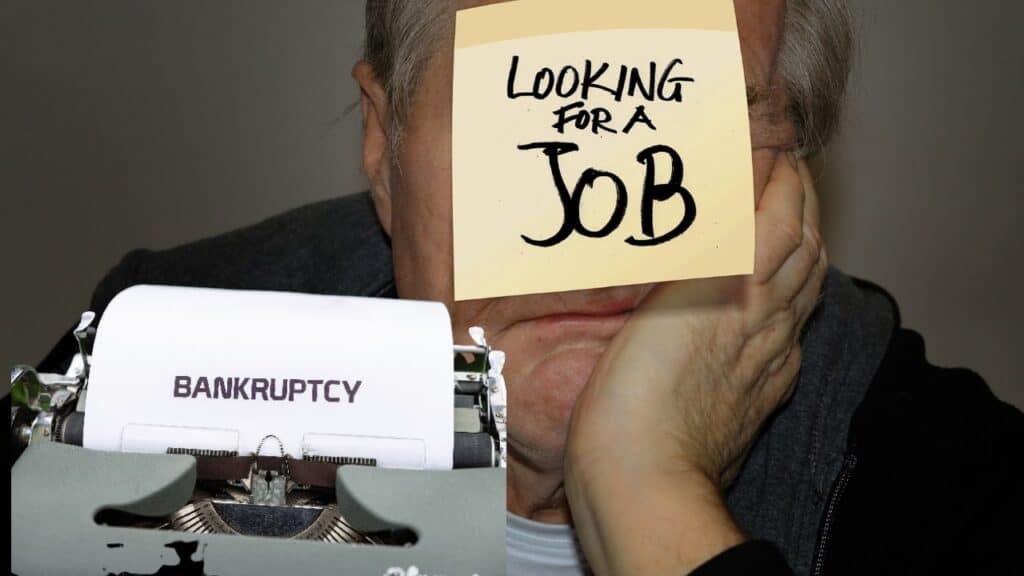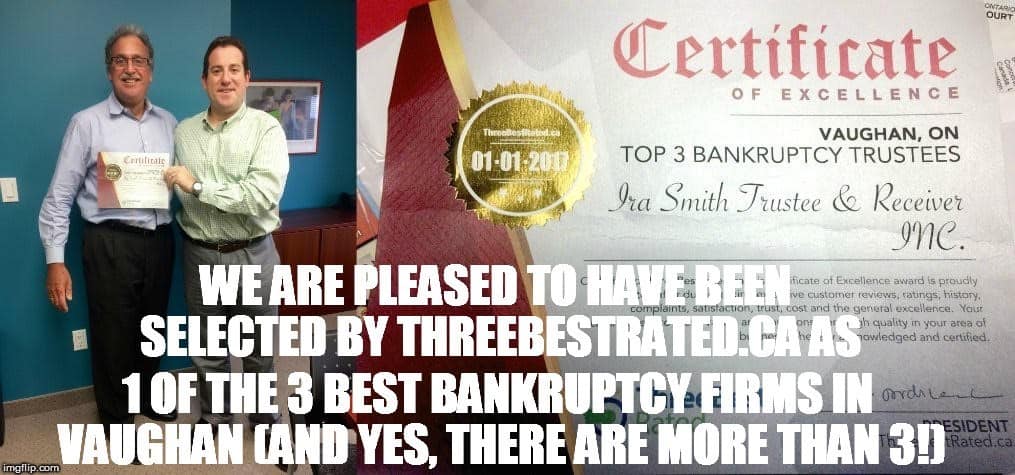We hope that you and your family are safe, healthy and secure during this COVID-19 pandemic.
Ira Smith Trustee & Receiver Inc. is absolutely operational and Ira, in addition to Brandon Smith, is readily available for a telephone consultation or video meeting.
Pension & Bankruptcy in Canada
Underfunding is a major concern for traditional, defined-benefit pension plans. In other words, do they have enough pension assets and therefore enough money to meet their projected future pension obligations? Inadequate actuarial assumptions, poor investment returns, and mismanagement can lead to pension plan underfunding. In the case of corporate insolvency of a large employer with a defined-benefit pension plan, this issue always arises. Underfunded pensions in bankruptcy wind up hurting retirees.
The Sears Canada court-supervised liquidation forced us to again focus on the treatment of pensioners in corporate bankruptcies under the Bankruptcy and Insolvency Act (Canada) (BIA) or restructurings and liquidations under the Companies’ Creditors Arrangement Act (CCAA). It was widely reported that representative for 17,000 Sears Canada retirees says insolvency laws are unjust when it comes to underfunded pensions.
PM Justin Trudeau is the only person who wants this election right now. Erin O’Toole, leader of the Conservative Party, promised to prioritize pensioners ahead of companies and creditors during bankruptcy and restructuring proceedings if he were elected.
This Brandon Blog discusses the issue of pensions in bankruptcy and how the Liberals had several opportunities to fix it but did not.
Pensions in bankruptcy: Pension and benefits issues in bankruptcy and restructuring
Pensioners suffer pension losses and ultimately pension income losses when a company is insolvent and its defined benefit pension fund plan is underfunded. In practice, the pensioners’ rights are weak and highly inadequate, especially when pension plans are underfunded. Although provincial and federal government pension legislation purports to offer some protection for amounts owing to an underfunded pension plan, insolvency legislation does not preserve that protection for the majority of those amounts. The insolvency protection of pensioners and pensions in bankruptcy is thus largely illusory.
Founder and Director of the National Centre for Business Law, Dr. Janis Sarra teaches law at Peter A. Allard School of Law. Canadian pensioners and employees, she believes, are among the worst protected pensions in bankruptcy and/or in insolvency among 60 countries.
In every Canadian province and territory, pensioners are protected by law in connection with pension deficits and pension payments. Specifically, every jurisdiction grants a deemed trust to protect employee pensions earned on employer assets owed to pension plans. The Pension Benefits Standards Act, which governs federally regulated pension plans, specifies the amounts that must be held separately from the employer’s funds, for example. Funds held in trust for active and retired pension plan members are not considered a part of the employer’s estate in liquidation or bankruptcy.
Under the Pension Benefits Act in Ontario, employers are required to hold all amounts owing to the pension plan in trust on behalf of their employees. According to the Supreme Court of Canada, the Ontario Pension Benefits Act creates a deemed trust over the entire wind-up deficit, subject only to the doctrine of paramountcy. Therefore, Ontario’s pension legislation expressly recognizes that the deemed trust is covered by all amounts of the employer owing to the pension plan.
The pension legislation in Quebec confers a deemed trust on special payments due in the year of insolvency. The special payments already due are deemed to be in trust, and the amount owing to the pension plan for unpaid special payments is deemed to be in trust based on Quebec’s pension law.
Due to other judicial decisions not giving effect to these deemed trusts in BIA and CCAA proceedings, the federal and provincial pension legislation has been hindered. In the meantime, to the extent that the BIA and CCAA protect pensions, the protection is negligible in practice. In Ontario (and every other province), provincial law protections are subject to the doctrine of paramountcy.
Paramountcy says that in the conflict between federal and provincial laws, federal law takes precedence. Both the BIA and CCAA are federal laws. The Supreme Court of Canada has held that provincial deemed trusts are not applicable to bankruptcy cases unless the BIA expressly permits them. There have even been successful attacks on federal pension law.
In accordance with existing regulations, the secured creditors may receive funds that would otherwise go to employees’ pension plans. Therefore, there really isn’t much protection for pensions in bankruptcy.

Pensions in bankruptcy: PM Justin Trudeau had his chance to fix this problem
Erin O’Toole doesn’t seem to be bringing up a new subject. The Liberal federal government had at least three chances to fix this pension issue for Canadian workers whose employers become financially troubled and have to liquidate or file for bankruptcy. A brief look at the recent history follows.
Let’s look at some history of attempts to protect pensions in bankruptcy. The Canadian Association for Retired Persons, a nationwide not-for-profit group, lobbied politicians on Parliament Hill about legislation changes. According to Wanda Morris, vice-president of CARP, the unfunded pension liability should be given priority so that it is handled first.
There is no priority for retirees when it comes to dividing up assets in bankruptcy, and Morris wants to protect underfunded defined benefit pensions when the company goes through restructuring or bankruptcy.
CARP estimates that roughly 1.3 million Canadians, aside from the retired Sears employees, may be at risk due to defined benefit pension plans. The closure of Sears Canada stores made the plight of retirees a top priority for CARP.
Marilène Gill, Bloc Québécois MP, introduced a member’s BILL C-372, on Oct. 17, 2017. It was intended to change the BIA and the CCAA. The change seeks to correct the injustice faced by retired workers whose pension and insurance policy benefits are not secured when their company declares bankruptcy or undergoes restructuring. As a result of Sears Canada closing locations, the changes were related to the employees’ and retirees’ treatment.
On October 17, 2017, Bill C-372 passed First Reading. The House rarely passes private member’s bills like this one. The Liberal Party did not support taking it further and allowed it to die.
Hamilton Mountain NDP MP Scott Duvall asked for leave to introduce Bill C-384 in the House of Commons on November 6, 2017. He proposed amending Canada’s insolvency laws so that companies must bring any pension fund to 100% before paying any other secured creditors. Additionally, it requires companies to pay termination or severance pay owing before paying secured creditors. Similarly, this bill passed first reading and then died.
Lastly, Senator Art Eggleton, P.C., proposed BILL S-253 shortly before his retirement to amend the insolvency legislation in Canada. After First Reading passed on September 18, 2018, Second Reading followed on September 25. By introducing this bill, the BIA and CCAA would be amended. The plan proposed to give priority to claims for unfunded obligations or solvency deficiencies of pensions. This is applicable to both solvent companies as well as companies that might become insolvent if certain shareholder payments were made.
The proposed legislation would also amend the Pension Benefits Standards Act as well as the Pension Benefits Standards Regulations in order to enable the Superintendent of Financial Institutions to identify when a pension plan’s funding is impaired and to recommend to the employer the necessary steps to fix it. It is not surprising that the Liberal federal government did not carry forward this bill.
Pensions in bankruptcy: Erin O’Toole vows to force bankrupt firms to pay pensions over executive bonuses
The Hon. Erin O’Toole announced on August 24, 2021, that if he wins the election he plans to protect workers’ pensions. In bankruptcy and restructuring proceedings, he pledges to give priority to pensioners over the corporations and most other creditors.
According to him, as part of Canada’s Recovery Plan, a Conservative government will change the law to ensure that workers come first in cases of bankruptcy and reorganization.
The Conservative Party of Canada will also improve pension security by:
- Preventing executives from receiving bonuses during a time of restructuring unless the pension plan is fully funded.
- Unlike in the past, underfunded pension plans will no longer be forced to convert to annuities, a practice that involves financial assets being disposed of and replaced with an insurance contract to reduce risks, as well as offer pensioners, fixed payments. The practice of companies failing during a recession when markets are depressed usually locks in losses and means workers receive less money.
- By mandating that companies report the funding status of their pension plans to their employees, they can provide their employees with greater transparency.
No further details were given. At least the Conservative Party is focused on this issue of when an employer is insolvent and there are pensions in bankruptcy.

Pensions in bankruptcy: Summary
We will have to wait to see the results of this election to know if anything might change when it comes to pensions in bankruptcy of the employer.
I hope that you found this pensions in bankruptcy Brandon Blog informative. An unexpected situation, such as your employer having financial trouble and entering liquidation or bankruptcy proceedings, by their very nature, are not pleasant and could have the effect of making your debt load now impossible to service. There are several insolvency processes available to a person or company with too much debt. You may not need to file for bankruptcy.
If you are concerned because you or your business are dealing with substantial debt challenges, you need debt help and you assume bankruptcy is your only option, call me.
It is not your fault that you remain in this way. You have actually been only shown the old ways to try to deal with financial issues. These old ways do not work anymore.
The Ira Smith Team utilizes new modern-day ways to get you out of your debt difficulties with debt relief options as an alternative to bankruptcy. We can get you the relief you need and so deserve. Our professional advice will create for you a personalized debt-free plan for you or your company during our no-cost initial consultation.
The tension put upon you is big. We know your discomfort factors. We will check out your entire situation and design a new approach that is as unique as you and your problems; financial and emotional. We will take the weight off of your shoulders and blow away the dark cloud hanging over you. We will design a debt settlement strategy for you. We know that we can help you now.
We understand that people with credit cards maxed out and businesses facing financial issues need a realistic lifeline. There is no “one solution fits all” method with the Ira Smith Team. Not everyone has to file bankruptcy in Canada. The majority of our clients never do as we know the alternatives to bankruptcy. We help many people and companies stay clear of filing an assignment in bankruptcy.
That is why we can establish a new restructuring procedure for paying down debt that will be built just for you. It will be as one-of-a-kind as the economic issues and discomfort you are encountering. If any one of these seems familiar to you and you are serious about getting the solution you need to become debt-free, contact the Ira Smith Trustee & Receiver Inc. group today.
Call us now for a no-cost consultation.
We hope that you and your family are safe, healthy and secure during this COVID-19 pandemic.
Ira Smith Trustee & Receiver Inc. is absolutely operational and Ira, in addition to Brandon Smith, is readily available for a telephone consultation or video meeting.







